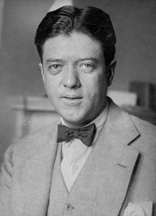Robert M. La Follette Junior
Robert Marion La Follette Jr. (Born February 6, 1895 in Madison , Wisconsin , † February 24, 1953 in Washington, DC ) was the successor to his father Robert La Follette sr. American Senator for Wisconsin from 1925 to 1947 . His brother Philip F. La Follette was the governor of that state.
Life
After attending school in Madison and Washington, Robert La Follette studied from 1913 to 1917 at the University of Wisconsin – Madison . He then worked from 1919 as the private secretary of his father, who had sat for Wisconsin in the US Senate since 1906. When Robert La Follette sr. died on June 20, 1925, his son ran for by-election for his mandate and was victorious, after which he was a member of Congress from September 30 of the same year . At that time, La Follette was still a Republican ; later he and his brother called the Progressive Party originally founded by their father as the Wisconsin Progressive Party back to life and ran successfully for this.
Like his father, Robert La Follette Jr. was. a worker rights advocate. He also made a name for himself in this area when he chaired a committee of inquiry ( La Follette Civil Liberties Committee ) between 1936 and 1940 , which uncovered measures which should prevent workers from organizing themselves.
After the dissolution of the Progressive Party , La Follette returned to the Republicans in 1946. In the same year he applied for their nomination for his Senate seat, but was defeated in the primary against Joseph McCarthy . After leaving the Senate on January 3, 1947, he worked as an author and advisor to the Truman government. On February 24, 1953, Robert La Follette committed suicide with a firearm. As a result, there was speculation as to whether he had done this because of years of depression or whether Senator McCarthy had been summoned to the Committee on Un-American Activities for alleged communist contacts.
Robert La Follette's son Bronson also became a politician and served a total of five terms as Attorney General of Wisconsin. Unlike his father and grandfather, he became a democrat .
Web links
- Robert M. La Follette in the Biographical Directory of the United States Congress (English)
| personal data | |
|---|---|
| SURNAME | La Follette, Robert M. Junior |
| ALTERNATIVE NAMES | La Follette, Robert Marion |
| BRIEF DESCRIPTION | United States Senator |
| DATE OF BIRTH | February 6, 1895 |
| PLACE OF BIRTH | Madison , Wisconsin |
| DATE OF DEATH | February 24, 1953 |
| Place of death | Washington, DC |

